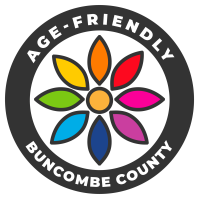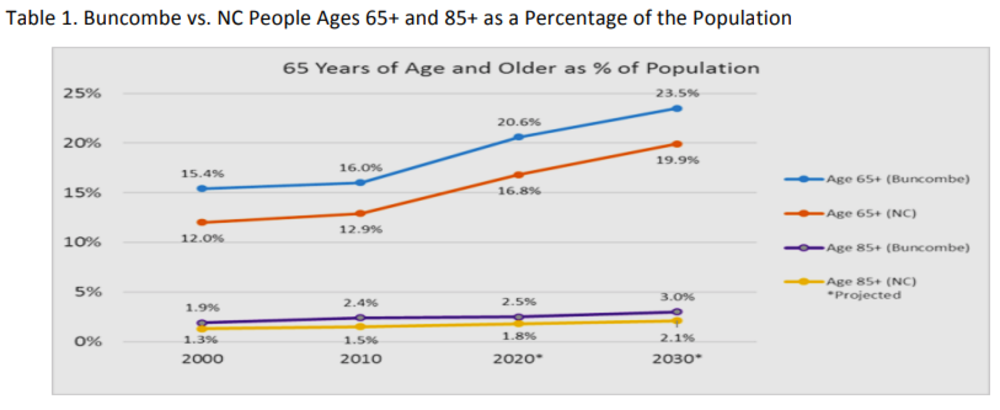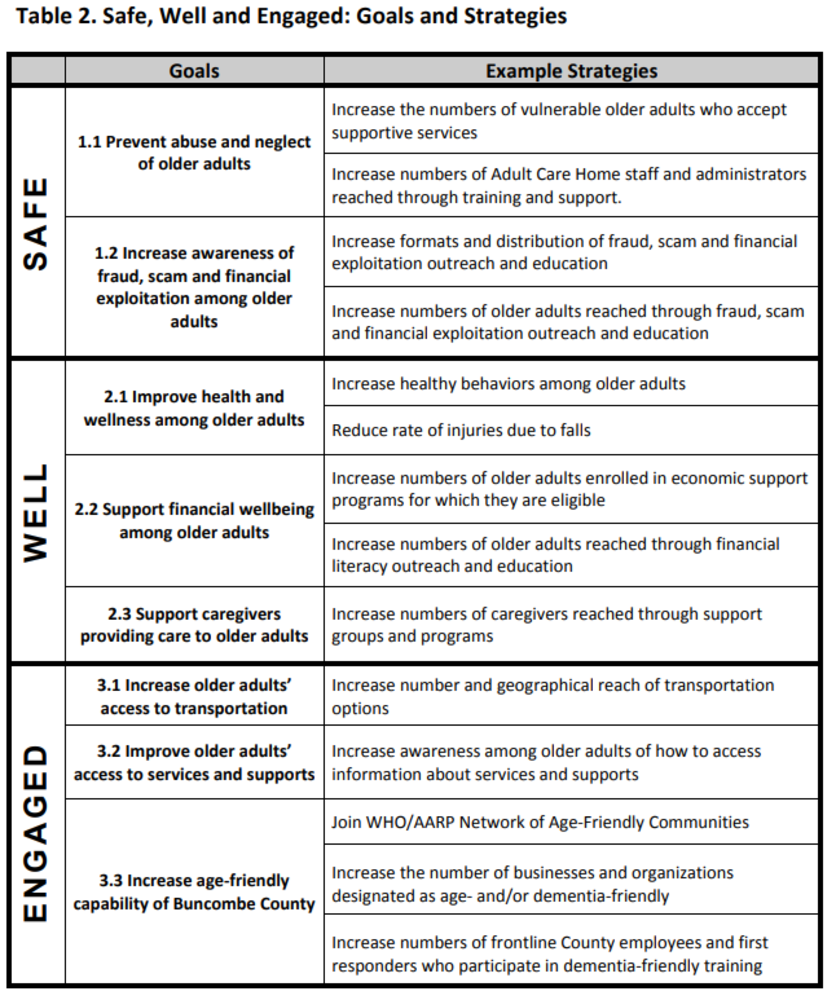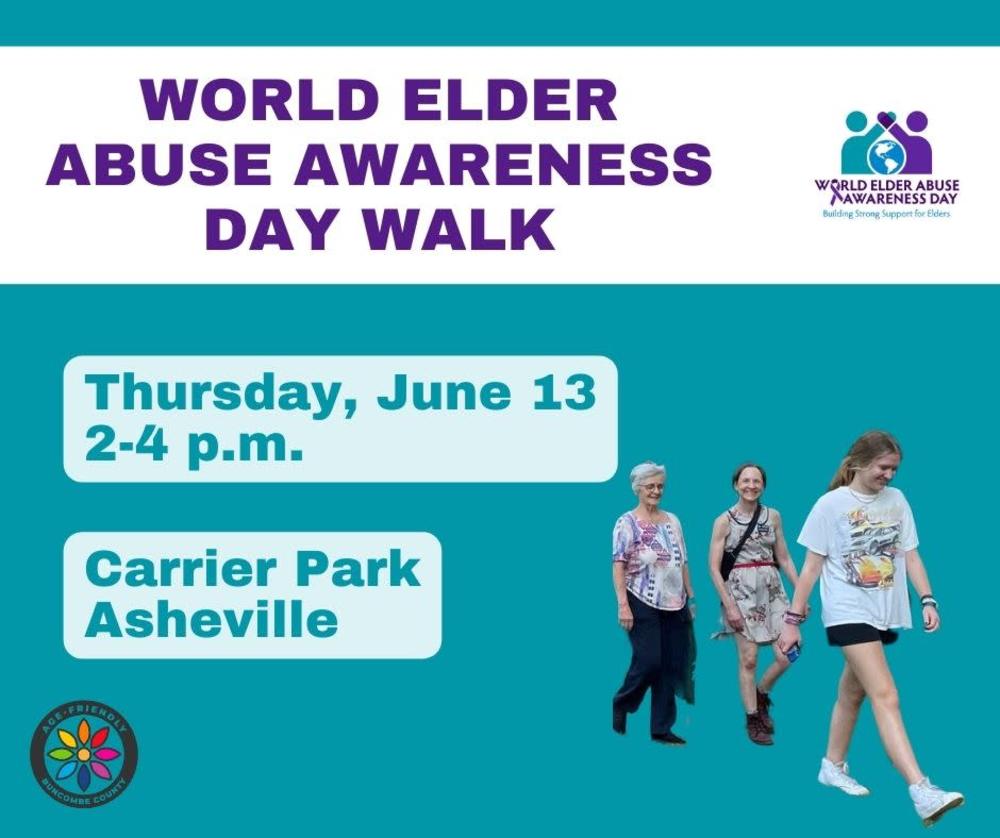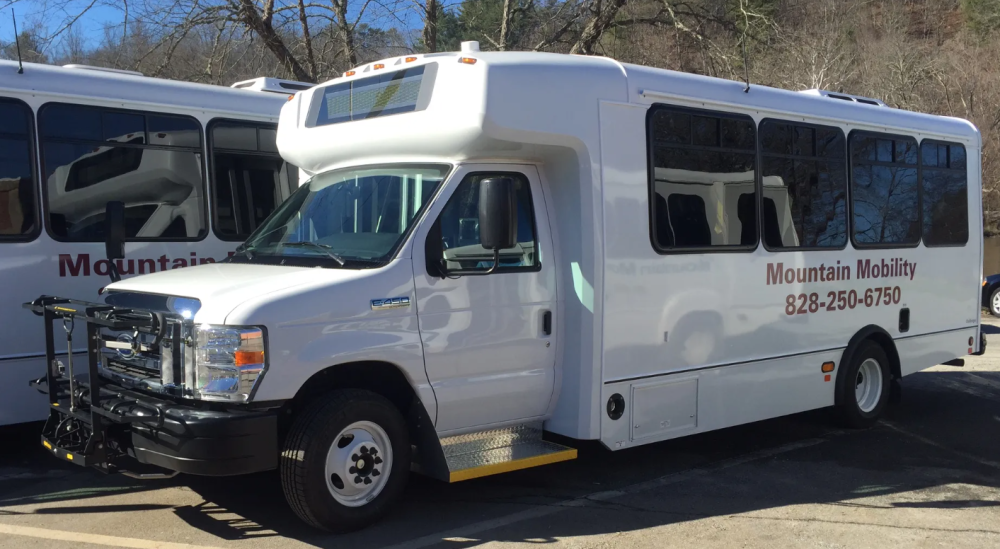Age-Friendly Buncombe County
Age-Friendly Buncombe County
A Community Vision for Age-Friendly Buncombe County:
The Buncombe County 2025 Strategic Plan focus areas include “Educated and Capable Community” and “Resident Well-Being” by supporting residents’ ability to age in place. The goal of Age-Friendly Buncombe County is to ensure that older adults are Safe, Well, and Engaged in our community. It will take partnerships and resources to ensure that safely aging-in-place becomes a reality for all residents of Buncombe County.
Currently, 75,000 residents in Buncombe County are 60 years old or older; making up nearly 30% of our overall population. The older adult population in Buncombe County is one of the fastest growing in the state and is projected to grow long into the future. As the number of older adults in our community rises, it is essential that we have an infrastructure in place to meet their unique needs.
To learn more about Age-Friendly Buncombe County, click here.
Buncombe County Aging Plan (2018-2022)
Committed to an Age-Friendly Community where older adults are safe, well, and engaged.
Introduction
In just a few years, one in five residents of Buncombe County will be age 65 or older. In fewer than twenty years (by 2035) projections suggest this ratio will be closer to one in four. North Carolina ranks 9th nationally in the number of people ages 65+ (see Table 1). Buncombe County has one of North Carolina’s fastest growing older adult populations; and, its age 65+ population is already greater in numbers, and as a percentage of the population, than its ages 0-17 population.
The Buncombe County Aging Plan for 2018-2022 builds on the successes and lessons learned over a decade of age-friendly community planning and implementation work guided by the Aging Coordinating Consortium (ACC), the County’s entity that is charged with overseeing the provision of services to older adults and the identification of service priorities and issues affecting older adults. The goals and strategies within this plan are the culmination of a comprehensive review of available secondary local, regional, and state data and reports.
The goals and strategies also reflect responses to two surveys conducted during the summer of 2017: the Community Aging Plan Survey, completed by over 1150 Buncombe County residents age 50+; and the Providers and Professionals Aging Plan Survey, completed by over 100 service providers and professionals who work with older adults in Buncombe County.
This Aging Plan reflects the vision of an age-friendly community where older adults are safe, well and engaged. This vision aims to answer the big question, “Why an aging plan?” and even, “Why an age-friendly community?” It is our hope with this vision that priorities and resources may be better focused and targeted toward demonstrable results. This plan also reflects a set of values established by the ACC to help guide its work, including how it allocates Home and Community Care Block Grant (HCCBG) funds and other limited resources.
We value:
• All older adults in Buncombe County, regardless of income or education level, race, ethnicity or nationality, ability, health or cognitive status, gender identity or sexual orientation, veteran status or religious affiliation.
• A systems perspective to help us understand and address the many complex challenges we face with changing demographics.
• A multi-dimensional definition of “livable, age-friendly community.”
• The term of a five-year plan allows Buncombe County sufficient time to engage many organizations and institutions in the creation and implementation of a sustained process of improvement toward becoming an age-friendly community.
This Aging Plan coincides with Buncombe County joining the World Health Organization (WHO)/AARP Network of Age-Friendly Communities (AFC) and launching a 5-year program, which will run parallel with this Aging Plan. In May 2017, the Commissioners resolved to join the Network, affirming that:
An “age-friendly community” has policies, services, and structures that facilitate older adults staying healthy, participating in economic growth, remaining socially active, and living in security. Communities in which older adults can “successfully age” are more likely to mitigate the challenges and enjoy the opportunities related to their older citizens. Actions leading to “age-friendly communities” lead to happier, healthier residents of all ages. Resolution Authorizing Buncombe County to Join the WHO/AARP Network of Age-Friendly Communities;” Consent Agenda; Buncombe County Board of Commissioners’ Meeting, May 2, 2017
The WHO/AARP Age-Friendly Community (AFC) framework contains 8 domains of livability that influence the quality of life for older adults: outdoor spaces and buildings, transportation, housing, social participation, respect and social inclusion, civic participation and employment, communication and information, and community and health services. Whereas earlier aging plans set goals and made recommendations within specific areas similar to the AFC domains (e.g., “social engagement,” or “financial wellbeing”), in this plan the goals stand independent of any particular domain assignment, recognizing that to truly improve the livability of a community for older adults, we must enable a diversity of community entities to forge strategic partnerships across silos. Within any given domain there exist multiple dimensions and stakeholders, thus to achieve the goals of this Aging Plan will require effort across many sectors.
The WHO/AARP Age-Friendly Community (AFC) framework contains 8 domains of livability that influence the quality of life for older adults: outdoor spaces and buildings, transportation, housing, social participation, respect and social inclusion, civic participation and employment, communication and information, and community and health services. Whereas earlier aging plans set goals and made recommendations within specific areas similar to the AFC domains (e.g., “social engagement,” or “financial wellbeing”), in this plan the goals stand independent of any particular domain assignment, recognizing that to truly improve the livability of a community for older adults, we must enable a diversity of community entities to forge strategic partnerships across silos. Within any given domain there exist multiple dimensions and stakeholders, thus to achieve the goals of this Aging Plan will require effort across many sectors.
As new and diverse stakeholders become engaged in the Age-Friendly Community initiative, it will be important for the ACC to evolve to accommodate the necessary growth and expansion into a truly community-wide coordinating body that accomplishes its mission. Thus, this Aging Plan includes specific recommendations regarding strengthening the capacity of the ACC.
Goals and Strategies
The vision for this (2018-2022) Aging Plan – of an age-friendly community where older adults are safe, well and engaged – is articulated into a set of goals and strategies (see Table 2). The goals were selected through a review of available data. They reflect pressing needs and have the potential to be effectively realized through a community-wide, collective effort led by the ACC. The strategies communicate clearly and simply how the ACC will work toward achieving the goals over the next five years.
For each strategy, the ACC will identify performance measures, develop an action plan, and create a dashboard, enabling the ACC to monitor progress toward desired results and to course-correct along the way.
Through collective and targeted efforts over the next five years, the Buncombe County Aging Coordinating Consortium will demonstrably move Buncombe County closer toward its vision of an age-friendly community where older adults are safe, well and engaged.
Aging Coordinating Consortium (ACC): Goals and Strategies
With this (2018-2022) Aging Plan, and the concurrent launch of the Age-Friendly Community (AFC) initiative, it is imperative that the Aging Coordinating Consortium (ACC) strengthen its capacity to serve as the coordinating body for increasingly more complex and cross-sector efforts to realize the vision of this plan and make Buncombe County an age-friendly community where older adults are safe, well and engaged.
Goal 4.1: Strengthen the capacity of the ACC to encompass the Age-Friendly Communities initiative and lead the implementation of this 2018-2022 Aging Plan effectively.
Example Strategies:
a. Revise the structure of the ACC to lead and monitor implementation of the 2018-22 Aging Plan.
b. Establish a strong executive committee to direct the activities of the ACC and monitor the implementation and progress/results of the Aging Plan.
c. Clarify the functions of the ACC and restructure meetings to effectively accomplish them.
d. Utilize the Governance Committee to create meaningful membership categories, facilitate an annual membership process including orientation, and revise the bylaws to reflect the restructure of the ACC.
e. Replace the Planning and Implementation Committee with work groups that set targets and create and implement annual actions plans for the Aging Plan’s goals and strategies.
f. Expand the scope and charge of the Allocations Committee to include resource development.
(1) Identify and seek new sources of funding.
(2) Develop decision-making matrix to align funding allocations with Aging Plan goals and values (e.g., evidence based/informed; interagency collaboration; equity and inclusion).
(3) Designate five percent County supplemental funds to invest in new solutions.
(4) Consider increasing amount of money set aside for this fund based upon demonstrable results. g. Closely align Advocacy and Awareness Committee activities with the Aging Plan’s goals.
h. Establish the Age-Friendly Community Steering Team, as called for in the Commissioners’ May resolution, as a committee of the ACC.
(1) Recruit ACC volunteers/individual members to lead this initiative.
(2) Engage diverse stakeholders from across the community to participate in this initiative.
(3) Recruit increased participation by older Buncombe County residents.
i. Use Results-Based accountability to monitor the Aging Plan and its progress.
(1) Build scorecard development into funding application process.
(2) Provide training and support for programs to develop appropriate scorecards.
(3) Establish bi-annual scorecard update reports to monitor progress and results.
j. Encourage partnering between existing organizations, initiatives and community entities to collaboratively achieve the goals of the Aging Plan.
k. Employ technology to advance the goals of the Aging Plan and to create systems for improved coordination among services, organizations and other community entities.
Acknowledgments
This Aging Plan is the result of over a year of effort by many individuals. We wish to thank the following for their work and leadership in developing this plan:
• Katie Bartholomew, Mission Health Partners
• Marla Browne, United Way/NC 2-1-1
• Rebecca Chaplin, AARP Associate State Director WNC
• Ali Climo, Coordinator, Buncombe County Aging Plan
• Celeste Collins, OnTrack Financial Education & Counseling
• Marc Czarnecki, UnITe WNC Silver to Gold; OLLI UNCA
• Richard Duncan, Universal Design Institute
• Linda Giltz, Community Planner
• Cathy Hebert, Dementia Friendly WNC
• Juanita Igo, Council on Aging of Buncombe County, Inc.
• Vicki Jennings, Mountain Mobility, Land of Sky Regional Council
• Alyson Johnson-Sawyer, CarePartners Adult Day Services
• Telle King, Dementia Friendly WNC
• Gene Knoefel, Senior Tar Heel Legislator
• Bob Krollman, ACC volunteer
• Charlie Lee, Mountain Mobility, Land of Sky Regional Council
• Bill O'Connell, Communities for Older Adult Health; OLLI
• Sheila O'Connor, No Place Like Home
• Derek Parris, Premier Home Health Care
• Diane Saccone, YMCA of Western North Carolina
• Linda Stanton, ACC volunteer
• Christina Stenhouse, Buncombe County Health & Human Services
• Stephanie Stewart, Area Agency on Aging, Land of Sky Rg Council
• Marsha Stickford, ACC volunteer
• Katie Swanson, Buncombe County Health & Human Services
• LeeAnne Tucker, Area Agency on Aging, Land of Sky Regional Council
• Ann Whisenhunt, Area Agency on Aging, Land of Sky Regional Council
• Sharon Willen, Wiser Together Wisdom Bank; AARP Volunteer; UnITe WNC Silver to Gold
• Judy Williams, AARP Volunteer
Thanks also to Madison Agardi for field data management; to Communities for Older Adult Health for funding this internship; to Emily Lehman-Rios for help coding open-ended survey responses; and to the many Buncombe County residents who volunteered to contribute to the Aging Plan surveys.
Join us for the 2024 World Elder Abuse Awareness Day Walk
Bring your family, friends, colleagues, and neighbors to the 2024 World Elder Abuse Awareness Day (WEAAD) Walk.
This multi-generational event is free to all and will include information about elder abuse, its impacts on our community, and information from local agencies that offer actions and supports to combat elder abuse. We will be providing reusable canvas grocery totes, magnets, and ice cream from Annie B’s.
Register now to receive your free tote bag!
